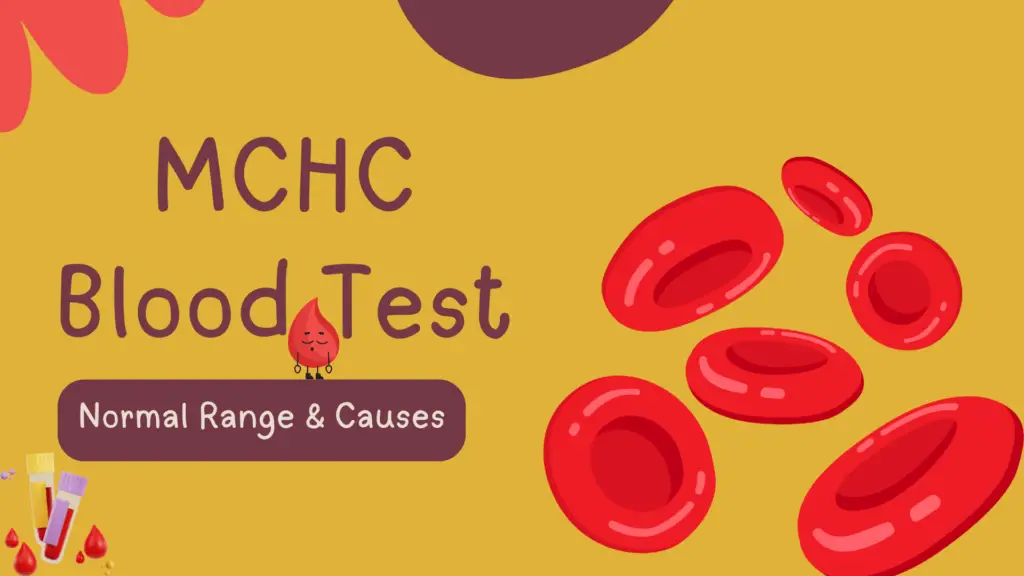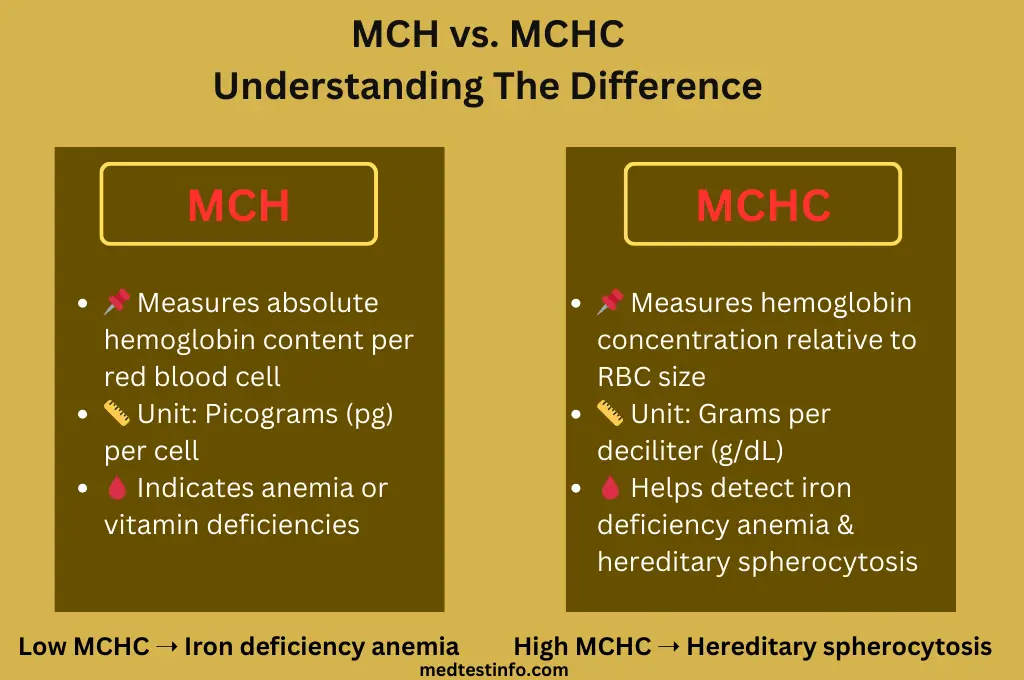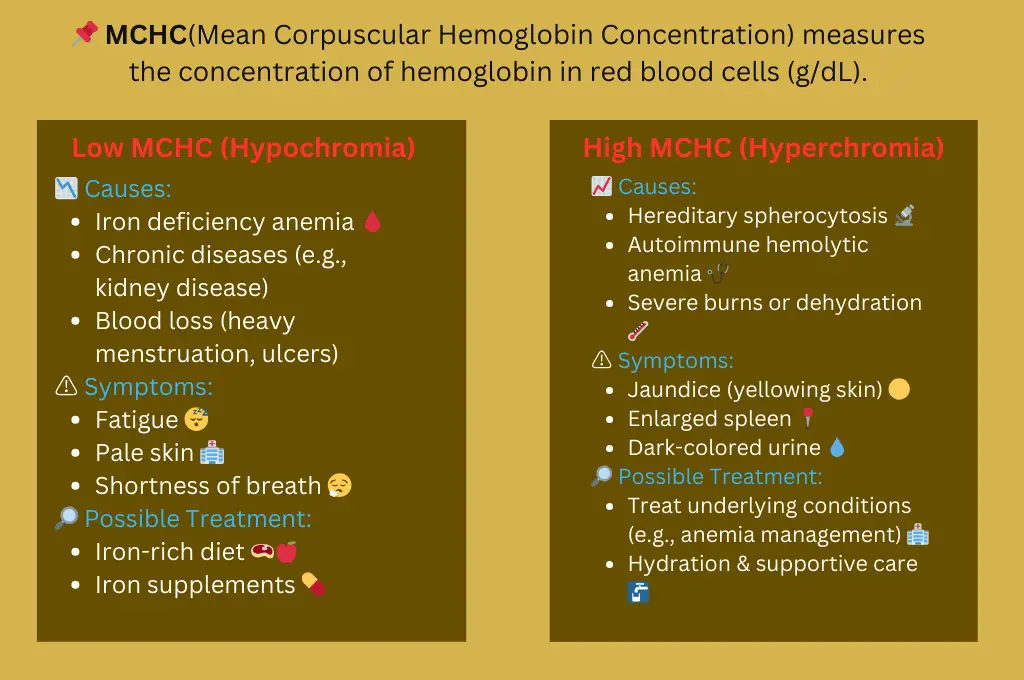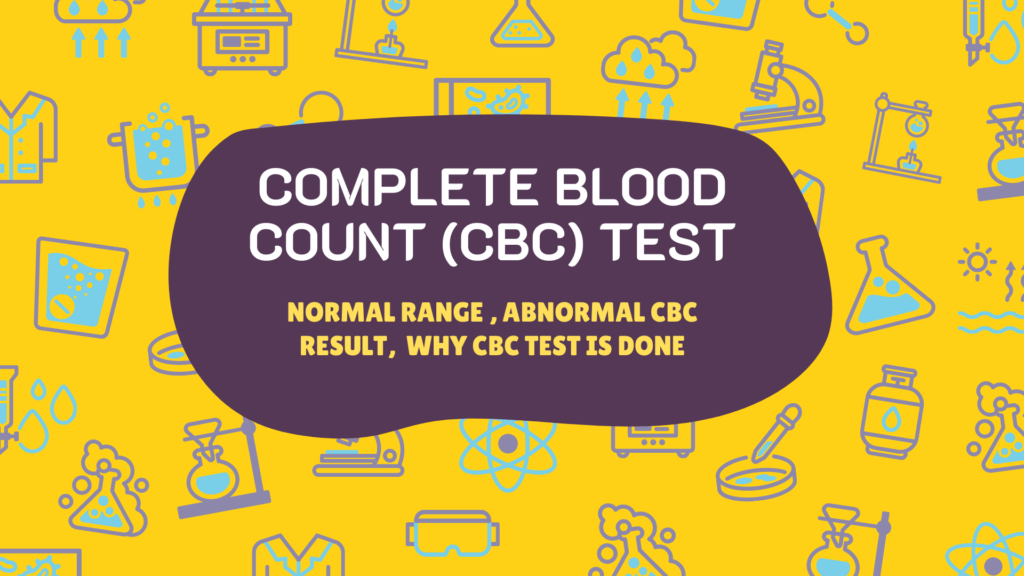
Overview
An essential component of a Complete Blood Count (CBC), the MCHC (Mean Corpuscular Hemoglobin Concentration) blood test gauges the average hemoglobin concentration in red blood cells. Hemoglobin is the protein responsible for distributing oxygen throughout the body, and its concentration within red blood cells influences their capacity for effective oxygen transport. The MCHC value offers vital information about a person’s blood condition, especially in diagnosing some forms of anemia and other blood diseases.
Usually, when a patient exhibits symptoms of anemia, tiredness, weakness, or problems associated with aberrant red blood cell function, doctors order an MCHC blood test. While MCHC is high in a blood test, a low MCHC count can hint at hereditary spherocytosis or autoimmune hemolytic anemia, iron deficiency anemia, or thalassemia. Sometimes, people may observe MCHC blood tests high during pregnancy, which could be attributable to underlying medical issues or transient physiological changes.
Early identification of possible blood diseases depends on a knowledge of MCHC lab results. This test offers a whole picture of blood health, often requested alongside other red blood cell indices, such as MCV (Mean Corpuscular Volume) and MCH (Mean Corpuscular Hemoglobin). The correct interpretation of CBC MCHC low signifies anemia or MCHC in hereditary spherocytosis, which indicates a genetic issue, thereby guiding medical actions.
What Is MCHC?
A Complete Blood Count (CBC) uses MCHC, or mean corpuscular hemoglobin concentration, to determine the average hemoglobin concentration in red blood cells. Hemoglobin is the iron-containing protein that lets red blood cells distribute oxygen throughout the body. Unlike other red blood cell indices, MCHC computation emphasizes the ratio of hemoglobin to the size of the red blood cell instead of the absolute hemoglobin concentration found.
Although individual variances may arise from age, health issues, and pregnancy, a normal MCHC blood test range usually falls between 32 and 36 g/dL. While some people may have low MCHC g/dL, suggesting possible anemia or other blood diseases, others may experience an MCHC blood test during pregnancy.

Difference Between MCH And MCHC
MCH (Mean Corpuscular Hemoglobin) and MCHC sound similar but measure different facets of hemoglobin in red blood cells:
MCH (Mean Corpuscular Hemoglobin): Measuring the absolute hemoglobin content of every red blood cell, MCH, or mean corpuscular hemoglobin, is represented in picograms per cell.
MCHC (Mean Corpuscular Hemoglobin Concentration): Expressing in g/dL, MCHC (Mean Corpuscular Hemoglobin Concentration) gauges hemoglobin concentration relative to red blood cell size.
This difference is essential since low MCHC lab results may indicate disorders like iron deficiency anemia. Still, MCHC in hereditary spherocytosis is usually raised because of irregularly shaped red blood cells. Furthermore, MCV, commonly below normal, helps diagnose.
Knowing low MCHC counts and high MCHC counts will help one properly diagnose and manage different health issues.
Normal Ranges Of MCHC
Usually falling between 32-36 g/dL, the MCHC (Mean Corpuscular Hemoglobin Concentration) blood test is in the normal range. Evaluating general blood health depends on knowing the average hemoglobin concentration within red blood cells, which this range denotes. Any departure from this range—that of MCHC blood tests high or low—may point to an underlying medical problem needing more research.
Factors That May Slightly Alter The Normal Range
MCHC lab results may vary somewhat depending on several factors:
Age and Gender: Although the MCHC typical range for females is often identical to that for males, hormonal changes, menstruation, and pregnancy can occasionally cause minor variances.
Pregnancy: Because of physiological changes in blood volume and hemoglobin levels during pregnancy, some people may find MCHC blood tests high.
Dehydration: If the body loses too much fluid, hemoglobin becomes more concentrated, resulting in a temporary high MCHC.
Iron Deficiency or Chronic Illness: Reduced hemoglobin generation follows from a low MCHC count commonly linked to iron deficiency anemia.
Hereditary Blood Disorders: Conditions like MCHC in hereditary spherocytosis produce elevated MCHC levels because of irregularly formed red blood cells.
CBC MCHC low values raise possible health issues; hence, a correct diagnosis requires interpreting these values in line with other blood parameters. Should MCHC be high on a blood test or below the usual range, more investigation could be necessary to identify the source and suitable course of action.

High MCHC Levels (Hyperchromic Anemia)
In a disease known as hyperchromic anemia—where red blood cells have an unusually high percentage of hemoglobin—the MCHC blood test has high result signals. This is unlike most anemia, which often results from low hemoglobin levels. MCHC computation is based on the hemoglobin-to-red blood cell size ratio. Hence, a high MCHC level indicates red blood cell structure or function alterations.
What Does High MCHC Mean?
Generally speaking, a high MCHC in a blood test indicates that red blood cells are more densely packed with hemoglobin than usual. Underlying medical diseases influencing red blood cell shape, lifetime, or oxygen-carrying capability can lead to this. Occasionally, MCHC blood tests high in pregnancy could be a transient fluctuation, but consistently high levels demand more research.
Possible Causes Of High MCHC
An elevated MCHC level can result from several medical disorders as well as from physiological elements:
Hereditary Spherocytosis
A hereditary condition whereby red blood cells change their usual biconcave morphology to become spherically shaped.
This causes MCHC in hereditary spherocytosis to be raised when the cells lose their flexibility and concentrate hemoglobin more highly.
Often diagnosed alongside MCV in hereditary spherocytosis, which may be normal or mildly lowered.
Autoimmune Hemolytic Anemia (AIHA)
A disorder whereby the immune system targets red blood cells and accelerates their breakdown.
Increased hemoglobin concentration inside the surviving red blood cells resulting from this damage raises MCHC lab findings above typical values.
Severe Burns Or Dehydration
Extensive burns can produce hemoconcentration and fluid loss, which would cause hemoglobin to look more concentrated in red blood cells.
Dehydration also lowers plasma volume, artificially raising high MCHC blood test values.
Macrocytic Anemia
A kind of anemia in which red blood cells are more significant than usual (high MCV) and could possibly include increased hemoglobin content.
Usually observed in disorders like pernicious anemia, either it is caused by shortage can bring it on.
Symptoms Of High MCHC
Those with MCHC blood test high values could have symptoms linked to decreased red blood cell flexibility and increased fragility, which would result in:
Weakness and tiredness
Shortness of breath
Pale or jaundiced skin (yellowish tint)
Enlarged spleen (in conditions like hereditary spherocytosis)
Increased risk of gallstones (due to excess hemoglobin breakdown)
Further diagnostic tests, such as reticulocyte count, peripheral blood smear, and Coombs test, are usually required to identify the underlying reason since high MCHC levels can be connected with significant blood diseases.
Low MCHC Levels (Hypochromic Anaemia)
A low MCHC level denotes hypochromic anemia, a disorder whereby red blood cells have a hemoglobin concentration lower than usual. The protein that delivers oxygen throughout the body is hemoglobin; hence, a low level might cause weakness and tiredness. In a blood test, a low CBC MCHC usually indicates that red blood cells are pale (hypochromic) and less effective in oxygen delivery.
What Does Low MCHC Mean?
A low MCHC indicates that red blood cells are not transporting sufficient hemoglobin in blood tests. Ordinary links to this syndrome are dietary inadequacies, chronic diseases, or hereditary defects influencing hemoglobin synthesis. Low MCHC count is usually linked to low MCHC g/dL values, so the red blood cells may seem lighter under a microscope.
Possible Causes Of Low MCHC
Several elements can cause MCHC lab results to be low:
Iron Deficiency Anemia
Iron deficiency anemia, in which the body lacks enough iron to generate enough hemoglobin, is the most common reason for the low MCHC blood test’s low meaning.
It can arise from a poor diet, regular blood loss—such as gastrointestinal bleeding or heavy menstruation—or iron absorption problems.
Usually accompanying a low MCV (mean corpuscular volume), the red blood cells are lighter (hypochromic) and smaller (microcytic) than usual.
Thalassemia
A hereditary blood condition influencing hemoglobin synthesis results in low MCHC count and irregularly shaped red blood cells.
Thalassemia sufferers often have low MCHC lab findings, yet their iron levels might be expected or raised.
The type of thalassemia will determine whether mild to severe symptoms result.
Chronic Diseases (Inflammatory Conditions, Kidney Disease, etc.)
Low MCHC levels can result from rheumatoid arthritis, chronic kidney disease (CKD), and chronic infections using compromised red blood cell generation.
MCHC is low even with normal or high iron reserves since inflammatory diseases might affect the body’s capacity to use iron correctly.
Symptoms Of Low MCHC
Low MCHC g/dL people could have symptoms connected to poor body oxygen transport:
Fatigue and weakness: Due to insufficient oxygen supply to muscles and tissues.
Pale skin or mucous membranes: A result of reduced hemoglobin levels.
Shortness of breath: Especially during physical activity.
Dizziness or lightheadedness: Caused by decreased oxygen reaching the brain.
Cold hands and feet: Poor circulation due to inadequate red blood cell function.
Low MCHC blood test results can indicate underlying medical problems; however, additional testing (such as iron studies, ferritin levels, and genetic testing for thalassemia) is usually required to identify the precise cause and suitable treatment.
How MCHC Is Measured
The mean corpuscular hemoglobin concentration (MCHC) measures various criteria of red blood cells, white blood cells, and platelets and is included in a Complete Blood Count (CBC) test. The MCHC computation yields the average hemoglobin concentration in a given volume of red blood cells, therefore offering critical new perspectives on anemia and other blood diseases.
Part Of A CBC (Complete Blood Count) Test
Ordered by doctors, a CBC test is a standard blood test meant to evaluate general health and identify various diseases, including infections, anemia, and blood abnormalities. Along with various red blood cell indices examined in a CBC, MCHC in blood tests is merely one of:
Hemoglobin (Hb) gauges the whole blood hemoglobin level.
Hematocrit, or Hct, is the blood volume’s red blood cell occupation percentage.
Measuring the average size of red blood cells, Mean Corpuscular Volume (MCV)
Indices the average hemoglobin content per red blood cell by mean corpuscular hemoglobin (MCH).
MCHC computation is based on hemoglobin and hematocrit measurements, which helps present a more comprehensive view of red blood cell condition.
Interpretation Of MCHC Values Along With Other RBC Indices
Analyzing MCHC levels with other red blood cell indices helps identify possible reasons for anomalies.
Low MCHC (Hypochromic Anemia)
Often found with low MCV, this suggests microcytic, hypochromic anemia—thalassemia or iron deficiency anemia.
Low findings on the MCHC blood test show red blood cells are paler than usual since they have less hemoglobin.
High MCHC (Hyperchromic Anemia)
Usually accompanied by normal or low MCV, it is found in autoimmune hemolytic anemia or hereditary spherocytosis.
Usually resulting from changes in red blood cell shape or dehydration, MCHC blood test high readings indicate that red blood cells have a greater hemoglobin concentration.
Normal MCHC (Normochromic Red Blood Cells)
Shows a regular hemoglobin content in red blood cells.
If anemia exists even with promising MCHC lab findings, other conditions, including blood loss or chronic illness, could be causing it.
MCHC in blood work is only one component of a complete blood test; hence, additional diagnostic procedures could be required if results show any medical issues. Doctors frequently employ other methods to identify the underlying reason for aberrant MCHC levels, including iron studies, vitamin levels, and bone marrow testing.
When To See A Doctor
Managing and diagnosing certain blood diseases depends on an awareness of MCHC levels. Although minor changes in MCHC lab results do not necessarily point to a major illness, consistently low MCHC count or high MCHC in blood test values could call for medical attention. Seeking prompt assessment can assist in finding and treating possible underlying medical conditions.
When To Get Tested For MCHC Levels
A doctor could advise an MCHC blood test as part of a Complete Blood Count (CBC) if a patient has anaemia or another blood condition. A few indicators suggesting the need for testing consist of the following:
Persistent fatigue and weakness: Weakness and constant tiredness might indicate low MCHC g/dL levels brought on by chronic illness or iron deficiency anaemia.
Pale skin and mucous membranes: Pale skin and mucous membranes might indicate hypochromic anaemia due to low haemoglobin content in red blood cells.
Shortness of breath or dizziness: Common anaemia symptoms like dyspnea or dizziness might call for a CBC MCHC with low mean values.
Unexplained bruising or prolonged bleeding: Unexplained bruising or protracted bleeding might be related to blood conditions influencing haemoglobin synthesis.
Family history of hereditary blood disorders: Family history of genetic blood disorders: Routine monitoring may be necessary for conditions such as hereditary spherocytosis, which is linked to MCHC.
Pregnant people may also need an MCHC blood test high pregnancy assessment if they have symptoms connected to anaemia. Since haemoglobin and iron levels change throughout pregnancy.
How To Improve MCHC Levels
Correct oxygen transport and general well-being depend on maintaining appropriate MCHC levels. Treatment hinges on the underlying aetiology and MCHC level, low or high.
For Low MCHC Levels
Often associated with iron deficiency anaemia, thalassemia, or chronic illnesses is a low MCHC level. Regarding raising MCHC levels, think about:
Increasing Iron Intake: Eat foods high in iron, such as red meat, leafy greens, seafood, beans, and fortified cereal, to boost your iron intake. Severe instances might call for iron supplements.
Vitamin C for Better Absorption: To improve iron absorption, match meals high in iron with sources of vitamin C, like citrus fruits.
Treating Underlying Conditions: Physician direction should be given to managing chronic diseases (such as renal disease or inflammatory disorders) that impact MCHC test findings.
For High MCHC Levels
Dehydration, autoimmune hemolytic anaemia, or congenital spherocytosis can all produce a high MCHC in a blood test. Management tactics include:
Maintaining Hydration: One can avoid excessive MCHC from dehydration by drinking enough water.
Managing Anemia: Should macrocytic anaemia or vitamin B12 deficiency be the source, doctors might advise dietary adjustments or supplements.
Treating Autoimmune Conditions: Medications such as corticosteroids or immunosuppressants might be required for autoimmune hemolytic anaemia.
Monitoring MCHC levels and treating underlying diseases or deficiencies would help restore balance and enhance general health.


